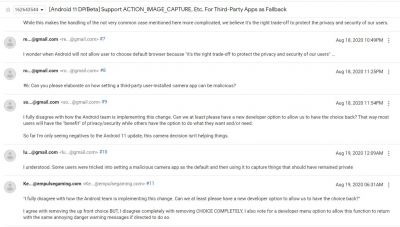With privacy concerns gaining momentum, Google will change how third-party camera apps interact with other applications. In Android 11, if you have set a third-party camera app (such as OpenCamera) as a default, Google will force you to use the in-built camera app to secure users' location data.
With every picture you click or video you take, the camera app geotags your image with GPS coordinates. The new feature "ensures that EXIF location metadata is correctly processed based on the location permissions defined within the app sending the intent," Google says.
What is Changing?
If it's confusing, let's simplify. For example, if an app that does not have a camera built-in, it will open the default camera app. Until Android 10, if you have a third-party camera app as a default, it will open that app. From Android 11 onwards, only built-in camera apps will be launched instead of the third-party one.

The move will force all the apps to explicitly declare which third-party camera apps they want to support. "While this makes the handling of the not very common case mentioned more complicated, we believe it's the right trade-off to protect the privacy and security of our users," Google's Android engineering team said.
What Won't Change?
However, the change will not impact your Facebook, Instagram, TikTok or Snapchat cameras. They already have built-in apps that are certified by Google. You will still be able to use cool filters using those cameras.
As for third-party camera apps like OpenCamera, A Better Camera, Camera FV-5 or Camera MX, you will still be able to use them and set them to default for taking pictures and videos. You can launch them by clicking on the icon or set a shortcut to launch the app.
Privacy Concerns
Apps with malicious codes can steal GPS data that is unintentionally shared with the app even if you never granted location permission, reported The Verge. The new guidelines are aimed at preventing that practice. Google has already updated its guide to developers, informing them about the change.

Google's new policy is perhaps guided by the incident of Shutterfly. The popular photo editing app was accused of collecting GPS coordinates from EXIF metadata and sending it to company servers in 2019. Researchers found over 1,000 apps that allegedly tried different methods to trick Android's permissions and harvest data from Wi-Fi connections and photo metadata. Shutterfly, however, denied the allegation and said it only collected location data when granted explicit permission.
Developers Not Happy
However, not all developers are happy with the change. One of the developers first thought it was a bug and reported it subsequently. But Google's product and engineering team responded to the bug report saying it was "intended behavior".
Since then, many developers have lashed out at Google's new guideline. One of the developers responded to the thread saying it was a bad idea. As for third-party camera app companies, they feel the move will hurt their business. Camera FV-5 that has over 10 million downloads said that the move was a shame and would impact its business.
"The move definitely will impact our app, and all third-party apps, as it will reduce its visibility and add unnecessary friction for the user that wants to use a third-party app like ours," Camera FV-5 developer Flavio Gonzalez said, adding that most app developers would not care to specify support for third-party camera apps like his.




Can Built-in Apps be Trusted?
While the move has faced a fair share of criticism, the aim of it can be appreciated. But there are still issues that are lingering over privacy. Popular Chinese phone manufacturers such as Huawei, Xiaomi, Vivo, Oppo and others are facing backlashes over fears of data sharing. In India, Xiaomi tops the charts in terms of the number of devices sold. But recently the government banned its browser and Mi Forum apps over privacy and data sharing concerns.
If that's the case, how can their in-built camera apps be trusted not to collect data? Google could have prevented such malicious apps from getting listed on Play Store instead, argued experts.









